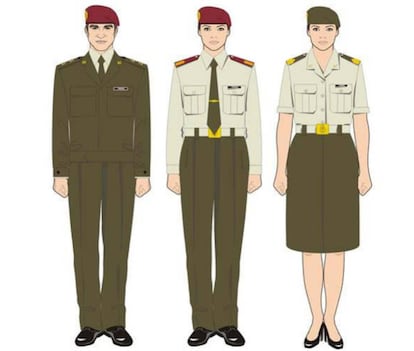Spain’s military to change recruitment rules against tattooed women
New norms announced after a female candidate reports being excluded because of a small foot marking

Spain’s Ministry of Defense has announced it will change the recruitment rules for the Armed Forces to ensure women with tattoos receive the same treatment as their male counterparts.
The announcement comes after Estela Martín, a 30-year-old from Madrid with a bachelor’s degree in psychology, appealed to Defense Minister Margarita Robles after she was barred from the selection process because of a seven-centimeter tattoo on her foot that would only be visible in the optional woman’s uniform, which includes a skirt and high heels.
All legal norms must respect the principles and constitutional values of equality
Ministry of Defense
The no-tattoo rule is only applicable to new recruits, not to individuals who are already members of the army. But the rules are not the same for men and women.
Under current regulations, women must wear a skirt and high heels on occasions where etiquette dress is required. Male recruits, however, are allowed to have tattoos on their legs from the ankle to their groin because they would not be seen under the official pants.
When the chairman of the selection committee saw Martín in a swimsuit on June 19 for her swimming trials, he was adamant: she was unsuited to join the military. If she were to wear a skirt, the tattoo – a flower – would be exposed.
On the decision, Martín argued: “I would like to know what’s the use of forcing women in the military to wear a skirt and high heels, other than preserving their image as mere ornaments, with their abilities and talents taking second place to their looks.”

To address this imbalance, the Ministry of Defense will change the entry rules to ban only tattoos and other body markings that are visible in the “common uniform for men and women” – in other words, in long pants and closed shoes.
According to the ministry, the goal is to stop “a woman with a tattoo or otherwise that is only visible in the exclusively female uniform, from being excluded” while allowing a man with the same tattoo to be accepted.
The ministry maintained that “all legal norms must respect the principles and constitutional values of equality.” It added that the female uniform “is optional for women” and that it had changed the regulations to “eliminate any doubt or margin of discretion from the selection committee.”
The new regulations will not come into effect until the next recruitment stage and will not be applied retrospectively. Unfortunately for Martín, this means that by the time the next selection process begins, she will be above the age limit for a military psychologist and be unable to apply.
English version by Melissa Kitson.
Tu suscripción se está usando en otro dispositivo
¿Quieres añadir otro usuario a tu suscripción?
Si continúas leyendo en este dispositivo, no se podrá leer en el otro.
FlechaTu suscripción se está usando en otro dispositivo y solo puedes acceder a EL PAÍS desde un dispositivo a la vez.
Si quieres compartir tu cuenta, cambia tu suscripción a la modalidad Premium, así podrás añadir otro usuario. Cada uno accederá con su propia cuenta de email, lo que os permitirá personalizar vuestra experiencia en EL PAÍS.
¿Tienes una suscripción de empresa? Accede aquí para contratar más cuentas.
En el caso de no saber quién está usando tu cuenta, te recomendamos cambiar tu contraseña aquí.
Si decides continuar compartiendo tu cuenta, este mensaje se mostrará en tu dispositivo y en el de la otra persona que está usando tu cuenta de forma indefinida, afectando a tu experiencia de lectura. Puedes consultar aquí los términos y condiciones de la suscripción digital.









































